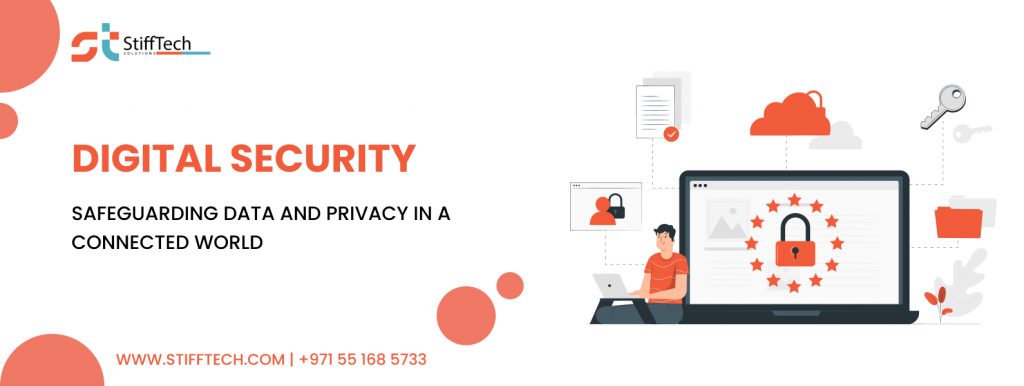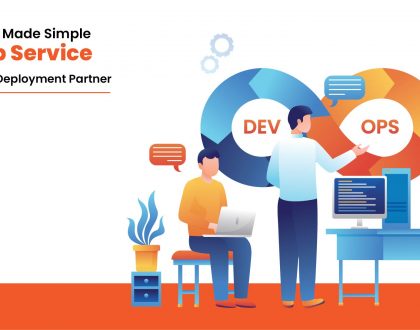Digital Security-Safeguarding Data and Privacy in a Connected World
by admin
September 6, 2023
in Custom Web Development, Data Privacy, Digital Security, Mobile App Development, Search Engine Optimization, Social Media Marketing, UI/UX Designing, Uncategorized, Website Development
No Comments
695

In today’s technology-driven world, digital security has become a major concern for individuals, organizations, and governments alike. With the rapid increase in digital data and the increasing reliance on information systems, securing sensitive information and ensuring data privacy has become vital.
The only truly secure system is one that is powered off, cast in a block of concrete, and sealed in a lead-lined room with armed guards. – Gene Spafford
What is Digital Security?
Digital security is a collective term that describes data protection and privacy in a connected world. It involves the implementation of various controls and measures to prevent unauthorized access, data breaches, and online threats.
Importance of Digital Security
The significance of digital security cannot be overstated. Data breaches and cyber attacks can lead to major financial losses, reputational damage, and lead to no privacy and security of individuals and organizations. Stifftech is an IT Company that handles the digital security of various organizations and is keen about organization’s privacy.
Digital Security System
A digital security system refers to the combination of practices, technologies, and policies implemented to protect digital assets such as data, information systems and communication networks. It consists of various components working together to ensure the integrity and availability of digital resources.
Here are some key measures of Digital security system which can be categorized as technical and non-technical measures:
Technical Measures
Encryption
Encryption is a process of scrambling data into an unreadable format using cryptographic keys. Encryption helps prevent data breaches, whether the data is in transit or at rest. If a corporate device is lost or stolen and its hard drive is properly encrypted, the data on that device will still be secure
Access Controls
Access control is an important component of data security that dictates who’s allowed to access and use company information and resources. This includes authentication mechanisms, such as usernames and passwords.
Vulnerability Assessment
Vulnerability assessments identify weaknesses and vulnerabilities in systems, applications, and networks. By conducting regular assessments, organizations can proactively address vulnerabilities and implement appropriate security controls to reduce the risk of exploitation.

Threat Detection
Threat detection involves monitoring and analyzing network traffic, system logs, and user behavior to identify potential security incidents or malicious activities.
Non-Technical measures
Security Awareness
Security awareness programs educate users about digital security best practices, common threats, and their roles and responsibilities in maintaining security. It aims to promote a culture of security consciousness and responsible digital behavior.
Security policies and procedures
Making clear and detailed security policies and procedures is vital. Policies help establish a baseline for security practices and provide employees with guidance on their responsibilities.
Digital Security Controls
Digital security controls include things such as usernames and passwords, two-factor authentication, antivirus software, and firewalls.
Firewalls act as a barrier between internal networks and external networks or the internet, preventing unauthorized access and potential attacks.
Data Protection
Data protection refers to the providing of tools and policies that actually restrict the access of data. Through it, companies can prevent data breaches, damage to reputation, and can better meet regulatory requirements. Data protection can sometimes also be called data security.
Data Privacy
Data privacy is the protection of personal information and the individual’s right to control how their data is collected, used, disclosed, and stored. It is essential in maintaining the trust of individuals and fostering responsible data management by organizations.
Stifftech gains the trust of their customers by securing data privacy of its customers instead of being mishandled.
Identity Theft
Identity theft is a significant concern in digital security, where unauthorized individuals gain access to personal information such as passwords, ID numbers, credit card numbers or social security numbers, to imitate someone else for fraudulent purposes.
Data Breaches
A data breach occurs when unauthorized individuals or entities gain access to sensitive or confidential information. It can have significant consequences for individuals and organizations, including financial losses, reputational damage, legal implications, and potential harm to affected individuals.

Types of Data Breaches
Data breaches can take various forms:
Hacking
Unauthorized individuals can make use of vulnerabilities in computer systems, networks, or software to gain unauthorized access to data.
Insider Threats
It is the misuse of data by the employees within an organization who has legitimate access to the data.
Phishing
Attackers use tactics, such as fraudulent emails or websites, to trick individuals into revealing their sensitive information.
Third-party breaches
This breach occurs through the external party that has access to the organization’s data.
Risk Mitigation
In the context of digital security, risk mitigation aims to minimize the likelihood and potential harm of security incidents, data breaches, and other adverse events. Effective risk mitigation requires a proactive approach that contains technical, operational, and managerial considerations.
Security Protocols
A security protocol is a set of rules and procedures designed to ensure secure communication and protect sensitive information in various computer networks and systems. The selection and implementation of security protocols depend on the specific security requirements and the nature of the communication or application being secured.
What are Privacy Regulations
Privacy regulations are legal frameworks and guidelines that govern the collection, use, storage, and protection of personal data. These regulations aim to protect individuals’ privacy rights and ensure that organizations handle personal data responsibly and transparently.
Types of Privacy Regulations
Here are some types of privacy regulations:
Personal Information Protection and Electronic Documents Act (PIPEDA)
PIPEDA is a Canadian federal privacy law that outlines individuals’ consent rights, data protection principles, and requirements for breach notification.
Personal Data Protection Act (PDPA)
The PDPA is a data protection law in Singapore that governs the collection, use, and disclosure of personal data by organizations. It outlines the obligations of organizations regarding consent, purpose limitation, data accuracy, data protection measures, and individuals’ rights.
General Data Protection Regulation (GDPR)
The GDPR is a comprehensive privacy regulation that came into effect in the European Union (EU) in 2018. The GDPR establishes requirements for data protection, consent, data subjects’ rights, data breach notification, and cross-border data transfers.
Cyber Defense
Cyber Defense involves the implementation of various proactive measures, technologies, and strategies to detect, prevent, and respond to cyber threats. It is an ongoing effort to adapt and respond to evolving cyber threats in order to protect critical systems, data, and the overall integrity of digital environments.
Conclusion
Digital security is an ongoing process that requires constant monitoring, assessment, and adaptation to emerging threats. It is a critical discipline in today’s connected world. It aims to safeguard data, protect privacy, and mitigate the risks associated with online threats and unauthorized access.
It used to be expensive to make things public and cheap to make them private. Now it’s expensive to make things private and cheap to make them public.
Clay Shirky



